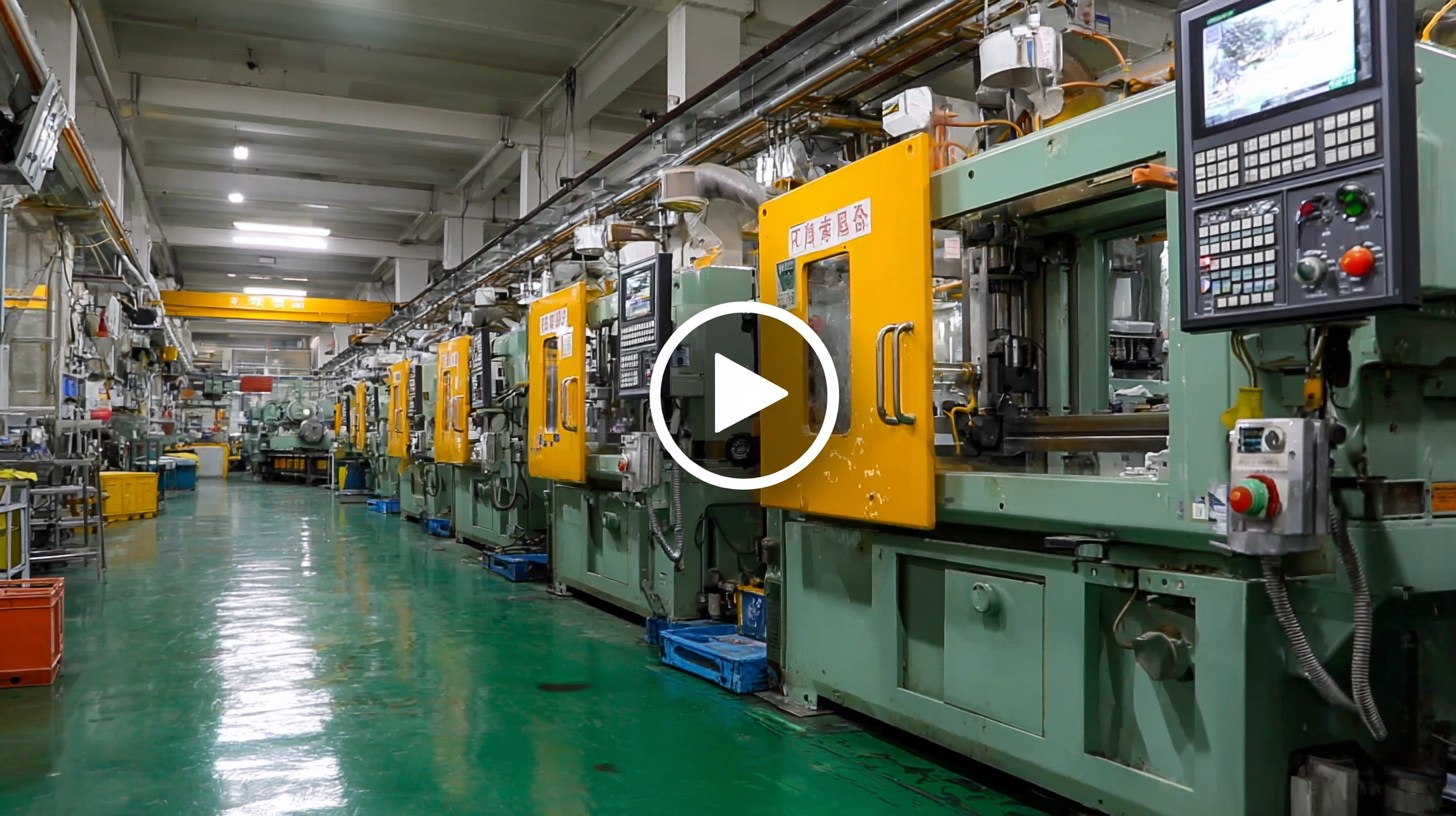 In recent years, the demand for Injection Molding Golf Cart Parts has surged, reflecting the broader trends in both the golf industry and the global manufacturing landscape. According to a report by Market Research Future, the global golf cart market is predicted to reach approximately $2 billion by 2025, driven by the increasing popularity of golf as a leisure activity and the rising demand for eco-friendly transportation solutions within golf courses.
In recent years, the demand for Injection Molding Golf Cart Parts has surged, reflecting the broader trends in both the golf industry and the global manufacturing landscape. According to a report by Market Research Future, the global golf cart market is predicted to reach approximately $2 billion by 2025, driven by the increasing popularity of golf as a leisure activity and the rising demand for eco-friendly transportation solutions within golf courses.
As manufacturers in China leverage advanced injection molding technologies, they are able to produce high-quality, durable parts that meet the rigorous standards of international markets. This influence not only enhances the performance and aesthetics of golf carts but also creates a vital bridge connecting Chinese manufacturing prowess with global consumer needs.
The synergy between quality and innovation in injection molding is thus pivotal for businesses looking to thrive in this competitive landscape.
Injection molding is a pivotal manufacturing process in the production of high-quality golf cart parts. This highly efficient technique allows for the mass production of precise and durable components that meet the rigorous demands of golf cart functionality. By heating plastic materials until they are malleable and injecting them into molds, manufacturers can create intricate shapes and a wide variety of parts, from body panels to interior fittings. The ability to produce consistent and repeatable quality makes injection molding an ideal choice for the golf cart industry, where performance and reliability are paramount.
Moreover, understanding the nuances of injection molding can greatly enhance the collaboration between Chinese manufacturers and global marketplaces. As the demand for golf carts continues to rise, manufacturers in China are leveraging advanced technology and skilled labor to produce top-tier parts. The strategic advantage of producing in China enables suppliers to offer competitive pricing while ensuring that international standards are met. By fostering these connections, companies can reduce lead times and adapt quickly to market changes, ultimately paving the way for a more integrated approach to golf cart production worldwide.
China has established itself as a leader in the injection molding industry, thanks to its ability to deliver high-quality products at competitive prices. The rapid advancements in technology, particularly in intelligent injection molding techniques, have enabled manufacturers to optimize production processes in terms of efficiency and precision. As a result, Chinese manufacturers can cater to the global marketplace by providing golf cart parts that meet international standards while maintaining lower costs compared to their counterparts in other regions.
In the realm of golf cart parts, the advantages of injection molding become evident in both the quality and functionality of the products produced. The current trend emphasizes the importance of sensing, optimization, and control in the production process, which significantly enhances product durability and performance. With the burgeoning demand for high-quality plastic components globally, China remains at the forefront, offering innovation and scalability to meet market needs effectively. As golf carts become increasingly popular for personal and commercial use, the integration of these advanced injection molding techniques will only solidify China's position in the global supply chain.
When sourcing golf cart parts, the decision between global suppliers and local manufacturers can significantly impact quality, cost, and delivery timelines. According to a report by the Global Parts Industry Association, around 60% of golf cart manufacturers are now outsourcing parts from international suppliers, primarily from China. This trend is driven by the competitive pricing and access to advanced manufacturing technologies that countries like China offer. However, the challenge lies in managing quality assurance and lead time, with 73% of companies citing these as major concerns when sourcing from overseas.

On the other hand, local manufacturers boast the advantages of faster turnaround times and easier communication. A study from the National Association of Manufacturers reveals that local sourcing can reduce logistics costs by up to 25%, making it an appealing option for businesses needing quick access to replacement parts. Additionally, local suppliers often provide more readily available support for quality control, ensuring that parts meet industry standards without the complexities of international trade. As the golf cart industry continues to grow, weighing these factors—cost efficiency versus quality assurance—remains critical for manufacturers looking to stay competitive in a global market.
Quality assurance in injection molding is crucial for manufacturers looking to ensure the integrity and safety of golf cart parts in a global marketplace. Adhering to rigorous standards and certifications not only bolsters consumer trust but also enhances operational efficiency. Companies must navigate various certifications, such as ISO 13485 for medical devices, which demonstrates a quality management system that meets customer and regulatory requirements. This standard, while primarily focused on medical applications, emphasizes the necessity of stringent quality processes to mitigate risks in manufacturing, aligning closely with the injection molding sector’s needs.

Furthermore, industry players are increasingly recognizing the importance of managing supply chain agility and intellectual property protection as they expand their footprint globally. As shown in recent reports, manufacturers in engineered plastics are adapting their infrastructures to meet rising demands for high-precision components. A robust quality assurance framework integrated with certifications can streamline processes and enable manufacturers to respond promptly to shifting market dynamics, ultimately fostering innovation in injection molding and related fields. With the growing emphasis on compliance and secure manufacturing practices, companies must prioritize quality certifications to successfully bridge the gap between local production and global distribution.
The landscape of golf cart parts is evolving rapidly, significantly impacted by innovations in injection molding technology. This advanced manufacturing process allows for the creation of highly complex and precise components that are essential for the functionality and aesthetics of golf carts. With the demand for customized and lightweight parts rising, manufacturers are leveraging state-of-the-art injection molding techniques to produce durable and high-quality components that cater to both casual and professional golfers alike.
Moreover, the integration of sustainable practices into injection molding technology is shaping the future of golf cart parts. With environmental concerns at the forefront, companies are exploring biodegradable materials and energy-efficient manufacturing processes. This shift not only helps reduce the carbon footprint but also aligns with the increasing consumer preference for eco-friendly products. As we bridge the gap between China’s robust manufacturing capabilities and the global marketplace, golf cart manufacturers are poised to benefit from these innovations, ensuring they meet the evolving needs of their customers while also paving the way for a greener future.
| Part Type | Material Used | Application | Innovation Trends | Market Demand (2023) |
|---|---|---|---|---|
| Body Panels | Polypropylene | Chassis Construction | Lightweight materials & Design Optimization | High |
| Seats | PVC / Vinyl | Comfort & Ergonomics | Sustainable materials & Custom designs | Medium |
| Dashboards | ABS Plastic | Instrument Cluster | Smart technology integration | Growing |
| Wheels | Nylon | Movement & Traction | Enhanced durability & Design versatility | High |
| Bumpers | Polyethylene | Safety & Protection | Impact-resistant designs | Stable |
